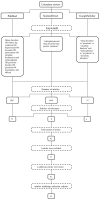Genetic Variations Associated with Sleep Disorders in Patients with Schizophrenia: A Systematic Review
- PMID: 29587340
- PMCID: PMC6023503
- DOI: 10.3390/medicines5020027
Genetic Variations Associated with Sleep Disorders in Patients with Schizophrenia: A Systematic Review
Abstract
Background: Schizophrenic patients commonly suffer from sleep disorders which are associated with acute disease severity, worsening prognoses and a poorer quality of life. Research is attempting to disentangle the complex interplay between schizophrenia and sleep disturbances by focusing not only on demographic and clinical characteristics, but also on the identification of genetic factors. Methods: Here, we performed a systematic literature review on the topic of genetic variations in sleep-disordered schizophrenic patients in an attempt to identify high quality investigations reporting scientifically sound and clinically useful data. For this purpose, we conducted a thorough search of PubMed, ScienceDirect and GoogleScholar databases, according to the guidelines of the Preferred Reporting Items for Systematic Reviews and Meta-analysis (PRISMA) protocol. Results: Our search yielded 11 eligible studies. Certain genetic variations were reported to be associated with schizophrenia-related sleep disorders. Antipsychotic-induced restless legs syndrome was linked to polymorphisms located on CLOCK, BTBD9, GNB3, and TH genes, clozapine-induced somnolence was correlated with polymorphisms of HNMT gene, while insomnia was associated with variants of the MTNR1 gene. Conclusions: There are significant genetic associations between schizophrenia and co-morbid sleep disorders, implicating the circadian system, dopamine and histamine metabolism and signal transduction pathways.
Keywords: circadian; genes; insomnia; polymorphisms; restless-legs syndrome; schizophrenia; sleep disorders; somnolence.
Conflict of interest statement
The authors declare no conflict of interest.
Figures


References
Publication types
LinkOut - more resources
Full Text Sources
Other Literature Sources

